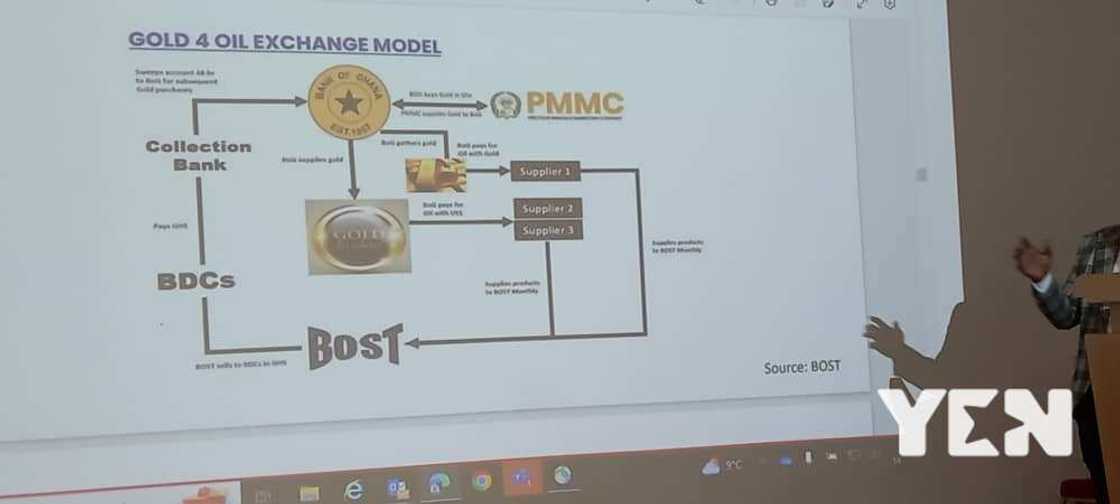Gold-for-Oil Policy Could Collapse Ghana’s Downstream Petroleum Sector: COPEC-GH Fears
- COPEC-GH's Duncan Amoah has asked the government to roll back on its Gold-for-Oil policy because of the imminent threat it poses to the country's petroleum sector
- He said at a forum held at the British High Commission in Accra on Tuesday, March 14, 2023, that the policy could also increase the pump price of fuel by more than 50%
- He explained that fuel goes through only three channels to get to the pump, however, under the Gold-for-Oil the channels are at least five, presenting an opportunity for players at each stage to add their profit margins to the final price
- Duncan also explained that the different channels that the new Gold-for-Oil policy creates are a major disruption to the globally accepted system, a situation that could discourage IOCs from bringing their cargo to Ghana
PAY ATTENTION: Enjoy reading our stories? Join YEN.com.gh's Telegram channel for more!
Petroleum expert with the Chamber of Petroleum Consumers Ghana (COPEC-GH) Duncan Amoah has cautioned the government about its Gold-for-Oil policy, warning that the initiative could disrupt Ghana's petroleum sector.
Amoah, who is also the Executive Director of COPEC-GH, said at a forum recently that the policy, which is being championed by vice president Dr Mahamudu Bawumia, could discourage international oil companies (IOCs) from bringing their products to Ghana.
When this happens, Ghana could be plunged into a shortage of fuels such as diesel and petrol as it happens in Nigeria sometimes, he feared.

Source: UGC
Addressing the forum held at the British High Commission in Accra on Tuesday, March 14, 2023, Duncan Amoah explained that the new Gold-for-Oil policy fails the test for transparency, warning that could make legitimate IOCs turn their cargo away from Ghana.
PAY ATTENTION: Сheck out news that is picked exactly for YOU ➡️ click on “Recommended for you” and enjoy!
Also, he said while the current system of getting refined fuel to consumers involves a simple three-channel system - IOCs to Bulk Distribution Companies (BDCs) to fuel stations - the channels under the Gold-for-Oil are more (at least five channels) and confusing.
"Under the Gold-for-Oil policy, the government takes the gold, gives it an intermediary who has a need for gold and dollars to pay for the gold, then he now pays an IOC, the IOC now supplies to BOST [Bulk Oil Storage and Transportation Company Limited], who now sells to the BDCs, who then sells to OMCs [or the fuel stations]," Duncan Amoah said.

Source: Original
He said because each of these channels is profit-oriented, consumers will pay more for the fuel that arrives at the filling station for them to buy.
He explained that even if each of the channels put a mark-up of GH¢1/$1 for their transaction it translates into GH¢5/$5 by the time the fuel gets to the fuel stations, compared to say GH¢3/$3 under the system before the Gold-for-Oil policy.
"We need to move slowly with this experiment," he explained.
The COPEC-GH boss told YEN.com.gh after the forum that if the government is truly determined to get cheaper fuel for Ghanaians while reducing the pressure on the cedi, the best thing to do is to fix the country's only refinery, the Tema Oil Refinery (TOR).
"The cedi depreciation is not caused by the dollars we use to buy fuel from the IOCs. They [the government] know how to fix the cedi depreciation. The Gold-for-Oil cannot be a solution to the cedi's problems, and involving the Bank of Ghana in this whole Gold-for-Oil business exposes our foreign reserves to risks," he said.
He also said the government would be better off investing its excess gold in the UK, where it can get better value and forex.
Civil society kicks against Gold-for-Oil policy
Vice President Dr Mahamudu Bawumia announced the government’s intention to pursue a Gold-for-Oil Policy in December 2022.
The move, the vice president explained is part of measures to reduce pressure on the local currency and to provide short-term economic relief to fuel consumers in Ghana.
But since then the government has been accused of poorly thinking through the policy and exposing the country to disruptions in the petroleum market.
Also, civil society groups say the government failed to consult them for their input before rolling out the crucial policy.
Despite these concerns, the vice president has said recently that the policy is achieving success.
Many experts have doubted this claim on grounds that the policy is not properly defined and does not provide figures for cross-referencing.
Government assures it has enough reserves to sustain policy
Meanwhile, YEN.com.gh reported not long ago that the Bank of Ghana gave the assurance that the country has enough gold reserves to sustain the Gold-for-Oil policy.
The central bank said Ghana has a sufficient quantity of gold bars to exchange for refined oil.
This assurance came after the government took delivery of the first consignment of the gold for oil deal.
.
New feature: Сheck out news that is picked for YOU ➡️ click on “Recommended for you” and enjoy!
Source: YEN.com.gh





